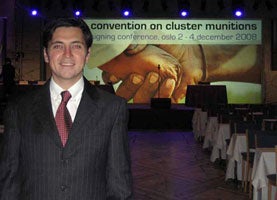Christopher Rogers ’09 has spent the better part of the past year in HLS’s International Human Rights Clinic working on issues related to cluster munitions, particularly surrounding the creation of the Convention on Cluster Munitions. Last week, in Oslo, Norway, he witnessed the results of his and others’ hard work when 94 states signed the new convention, which bans cluster munitions.
As part of his work, Rogers worked with Lecturer on Law and Clinical Instructor Bonnie Docherty on an advocacy paper, co-published by Human Rights Watch, that was distributed to state delegates during the final round of treaty negotiations in May 2008 in Dublin, Ireland.
The paper focused on the issue of joint military operations between state parties to the Convention and states that have not yet ratified the treaty—one of the thorniest issues in the negotiations. The paper’s suggestions were not adopted in full, but its arguments for a strong provision helped lead to language in the final text saying parties must encourage their non-party allies to abide by the treaty. It was the first time that language like this has been included in a weapons treaty.
“Being involved with the cluster munitions ban has been an incredible experience—a unique opportunity to create new international law that will save lives,” said Rogers. “In addition, it establishes important legal precedents that will be the foundation for future campaigns that seek to protect civilians from the effects of war.”
In Dublin, Rogers, as well as clinical students Emily Broad ’08, Jessica Corsi ’10, and Alison Kamhi ’08, also provided legal assistance to the Cluster Munitions Coalition, a group of 300 non-governmental organizations working for the passage of the convention. They drafted proposals for alternative treaty language, wrote legal memos for NGOs, and conducted a briefing on the signature and ratification process and how the ban will be enforced around the globe.
“The signing of the convention in Oslo caps years of hard work for thousands of campaigners,” said Rogers. “For me, it was a privilege to be involved in the campaign during the critical negotiations in Dublin and the signing ceremony in Oslo. Civil society from across the world came together and drove an international process that has led to a groundbreaking advance in international law.”
–Mike Jones
